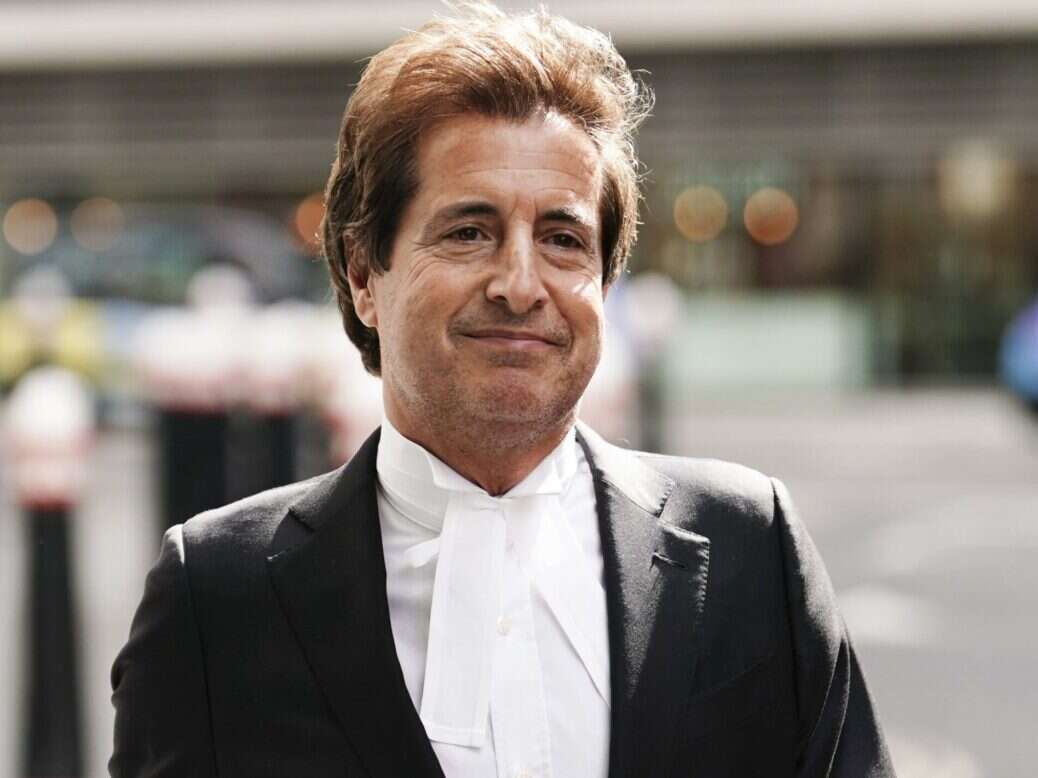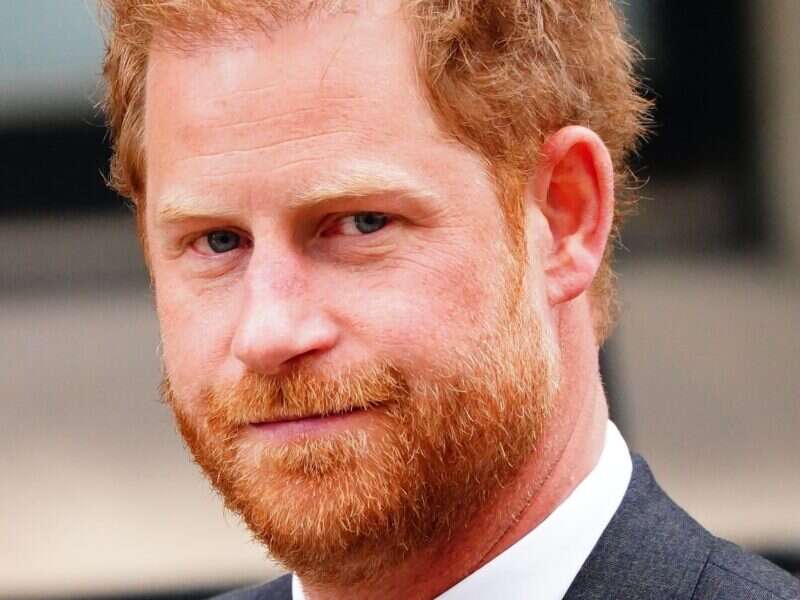
There is “hard evidence” that unlawful information gathering was “widespread” at Mirror Group Newspapers (MGN), the High Court has heard as the ongoing hacking trial draws to a close.
The court began hearing closing speeches from lawyers on Tuesday in the case being brought by a number of people, including the Duke of Sussex, against the tabloid newspaper publisher over alleged unlawful activity at its titles – the Daily and Sunday Mirror and the Sunday People.
Harry, 38, is suing MGN for damages, claiming journalists at the tabloids were linked to methods including phone hacking, so-called “blagging” or gaining information by deception, and use of private investigators for unlawful activities.
He is one of four “representative claimants”, alongside actor Michael Turner, known professionally as Michael Le Vell, best known for playing Kevin Webster in Coronation Street, actress Nikki Sanderson and comedian Paul Whitehouse’s ex-wife Fiona Wightman.
Their complaints cover a period from as early as 1991 until at least 2011, the court has heard.
The findings made by judge Mr Justice Fancourt in relation to those four will be used to determine the outcome of dozens of claims brought by others against MGN – including actor Ricky Tomlinson, the estate of the late singer George Michael, ex-footballer and television presenter Ian Wright and Girls Aloud singer Cheryl.
MGN is largely contesting the claims and denies that any of the articles complained of resulted from phone hacking, while contending that the vast majority did not arise from any other unlawful activity.
The publisher has made a limited number of admissions of unlawful activity in relation to the duke, Sanderson and Wightman, for which the publisher has apologised and accepted they will be entitled to some damages, but denies the majority of their claims and Turner’s entire case.
Mirror titles ‘used tried and tested tools of the tabloid trade’
David Sherborne, representing Harry and the other claimants, told the court on Tuesday that there was “enough hard evidence” to establish that unlawful activity was “widespread” at MGN.
He said unlawful methods of obtaining information were “the stock in trade at these newspapers across the entire period”, describing them as the “modus operandi” of journalists.
“These methods were the tried and tested tools of the tabloid trade,” Sherborne told the court.
The barrister claimed MGN’s board and legal department, “the very people whose duty it was to run this public company”, were “well aware” of unlawful information gathering being widespread.
Sherborne said the judge could draw “adverse” inferences from MGN’s “extraordinary decision” not to call “key witnesses” during the trial.
He said the Duke of Sussex, Sanderson, Turner and Wightman gave evidence in court despite “the obvious strain and distress it caused them having to relive difficult periods in their lives”.
“What was equally significant was those who were not coming to give evidence,” Sherborne continued.
In written arguments, he said: “There was a distinct lack of evidence called by MGN in the individual claims as to the provenance of the articles complained of and other (unlawful information-gathering) not related to articles.”
‘Notable absentees’ on witness stand included ex-Mirror editor Piers Morgan
Sherborne told the court MGN had called “just three journalists” during a six-week trial, over allegations spanning 20 years and in relation to 100 different articles.
He said this was “not so much Hamlet without the Prince of Denmark, it’s Hamlet without the entire royal court”.
The barrister said in written arguments there were “notable absentees” in all four claims and referred to a list of more than 20 people who have not given evidence, which was read by the judge last week and included former MGN editors Piers Morgan and Neil Wallis.
Sherborne told the court the publisher had provided “no positive explanation at all” over why certain witnesses were not called, describing it as a “gaping hole in their case”.
He contested MGN’s position that it had been “proportionate” in its approach to evidence and that ex-Mirror editor Morgan’s absence was “avoiding a sideshow that would distract from other issues in the case”.
“If anything the sideshow has been created by him,” Sherborne said of Morgan, as well as in relation to comments made be Wallis, former editor of The People, adding: “By making comments outside court which they were not prepared to have tested inside court”.
Sherborne said MGN’s position “is utterly untenable”, adding that the facts of the case “undermine” any of the publisher’s “excuses” over why certain journalists were not called as witnesses.
The barrister said there were “clear allegations” in relation to Morgan in the case for two or three years, but he had “chosen to confine his comments to outside this court room”.
In written arguments, Sherborne said: “Instead of calling these crucial witnesses, MGN’s approach was effectively to sit back and force the claimants to prove their cases based on the far from complete disclosure which they have obtained through repeated – resisted – applications for disclosure.”
He said that, without calling any of the journalists involved in preparing most of the stories, the court must effectively reach the conclusion it was obtained through unlawful means, adding: “In short, without live evidence there is nothing to negate a finding of unlawful activity.”
The barrister added: “For the court to adopt any approach other than that set out above would be to reward MGN’s failure to call crucial witnesses, by placing it in a more advantageous position than the claimants, who were deprived of the right of questioning journalists as to articles and the documents on which MGN relies.
“While the claimants – who on any view are not even accused of unlawful or dishonest conduct – actually attended court and subjected themselves to very challenging, distressing and on some occasions aggravating cross-examination.”
He said this included the “provocative suggestion that the Duke of Sussex ‘wanted to have been phone hacked’ as well as “repeated gratuitous references to modelling photographs of Ms Sanderson in lingerie”.
Sherborne said it also included “extremely intrusive questioning” of Wightman about the period of her cancer treatment and breakdown of her marriage to Whitehouse, and the “equally intrusive and speculative questioning of Mr Turner over his arrest for a serious sexual offence and his attempts to cope with the consequences of a traumatic period in his life”.
He added: “The impact of this cross-examination on each of the claimants was visible while it happened.”
Sherborne told the court that MGN spent “millions” on private investigators in total throughout the period complained of and the “financial management” of MGN were “well aware” that the information was being “obtained illicitly”.
He also said the findings made in a 2015 ruling on the only other trial on unlawful information gathering at MGN were a “solid basis” on which the judge could base his own conclusions.
Prince Harry should receive max £500 compensation, MGN says
Andrew Green KC, for MGN, said in written submissions released as closing arguments began that the “vast majority” of payment records to third parties either do not concern Harry, do not concern unlawful information gathering, relate to legitimate inquiries or do not relate to articles in the duke’s claim.
Green said: “There is only one occasion of admitted unlawful information gathering in respect of the Duke of Sussex, in February 2004.”
He continued: “In this case the Duke of Sussex should be awarded a maximum of £500, given the single invoice naming him concerns inquiries on an isolated occasion, and the small sum on the invoice (£75) suggests inquiries were limited.”
At the start of the trial in May, Green said the publisher “unreservedly apologises” to the duke for this occasion and that it accepts he was entitled to “appropriate compensation”.
The barrister said that it was admitted that a private investigator was instructed, by an MGN journalist at The People, to unlawfully gather information about his activities at the Chinawhite nightclub one night in February 2004.
He told the court: “MGN does not know what information this related to, although it clearly had some connection with his conduct at the nightclub.”
“Otherwise, the specified allegations are denied, or in a few cases not admitted,” he added.

The barrister said that there was a People article published in February 2004 “giving the recollection of a woman Harry spent time with” at the club.
Green later told the High Court this was not one of the 33 articles selected for trial in Harry’s claim, “so it is not alleged that this instruction led to the publication of his private information”.
Addressing these 33 articles in his written closing submissions, Green said the evidence does not suggest they were written as a result of unlawful activity and therefore Harry is not entitled to damages.
The barrister added: “If, contrary to MGN’s position, the court finds that any of the articles were the product of unlawful activity, we have included… the appropriate award for the articles.
“In most instances that is still zero: this was simply not the Duke of Sussex’s private information.”
These suggested figures for potential awards, if they were found to be products of unlawful information gathering, include up to £5,000 for an article in 2000 about an injury Harry had suffered.
‘Sympathy’ for Prince Harry over ‘media intrusion’
In his written closing submissions, Green later said that the duke was not entitled to damages for distress and that he had not identified “specific distress” caused by alleged unlawful acts by MGN.
“He was able only to identity upset and anger at the general intrusion he faced by every media outlet, nationally and internationally, over many years,” the barrister said.
Green added there was no basis to find the duke was a victim of phone hacking “either on an occasional basis, habitual basis, or even on one occasion”.
The barrister also said: “It is impossible not to have enormous sympathy for the Duke of Sussex, in view of the extraordinary degree of media intrusion he has been subject to throughout his life due to his position in society.
“However, establishing that an individual is a victim of general and widespread media intrusion leading to negative effects at the hands of the press is not the same as demonstrating that he/she is a victim of unlawful voicemail interception and other unlawful information gathering by three specific newspaper titles.”
Mr Justice Fancourt will deliver his ruling at a later date.
Email pged@pressgazette.co.uk to point out mistakes, provide story tips or send in a letter for publication on our "Letters Page" blog
